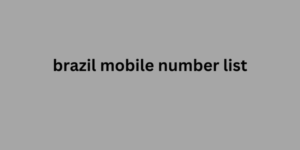In other words, under PMP, publishers reserve their premium inventory for a limited number of partners who meet certain criteria, rather than opening it up to all interested advertisers.
Private Market (PMP)
Source: shutterstock.com
Advertisers selected for special deals receive a brazil mobile number list special code that is valid for a certain period of time and gives access to a closed auction. Once publishers set a minimum price, a heated battle for impressions begins. As a result, the most generous bid wins, and the ad appears on users' screens.
PMP Privileges
Elite Quality. With the private marketplace, both advertisers and publishers receive priority and superior quality placement. The former gain access to premium sites, while the latter have a wide range of control over the content of their advertising space.
Transparency is key to a win-win relationship. On one side are advertisers who have a clear picture of what they are buying, and on the other are publishers who can easily determine what inventory is available.

Maximum relevance is the advantage of programmatic marketing with limited access. Thanks to the invitation format, publishers can provide the most relevant ads to their visitors, which is certainly pleasing to advertisers.
Increased profits are the main argument for publisher participation. Control over placement and fixed prices in programmatic direct deals helps to increase revenues and improve financial health.
Disadvantages of this type:
High competition: publishers and advertisers fight for space in PMP auctions.
Global coverage is limited.
Manual configuration of publisher criteria is required.
Guaranteed programmatic: what is it and how does it work
Unlike RTB (Real-Time Bidding) and PMP (Private Marketplace), the programmatic format "Guaranteed" provides guaranteed reservation of places for a specific advertiser. In this format, there is no bidding process, and instead, the distributor and publisher agree on a fixed price (CPM) and the number of impressions. The marketing place is reserved specifically for this buyer.
This type of programmatic advertising resembles traditional media buying, where prices and terms are negotiated in advance. However, the process is still automated and takes place in the programmatic ecosystem, eliminating the manual exchange of ad tags, resolving disagreements, issuing insertion orders, and monitoring billing.
Guaranteed programmatic what is it and how does it work
Source: shutterstock.com
While both programmatic Guaranteed and PMP offer exclusivity, they differ in approach. Guaranteed deals are made directly between the advertiser and the publisher and guarantee placement at a fixed price.
With PMP, deals are handled through a marketplace where invited advertisers bid and the highest bidder wins, but this does not guarantee inventory availability.
Benefits of Guaranteed Programmatic:
Premium inventory: Advertisers gain access to carefully selected premium ad spaces, increasing relevance to the target audience.
Guaranteed impressions and security. Both parties to the deal commit to a contract that guarantees advertisers a precise number of impressions and publishers the sale of inventory at an agreed price.
Complete control. Advertisers know exactly where and when their ads will be placed, and publishers have confidence in the expected income, since expenses are guaranteed.
Cons of Guaranteed Programmatic
High Budgets: The Guaranteed format requires large budgets from advertisers, in exchange for control over the exact placement and cost of ads.